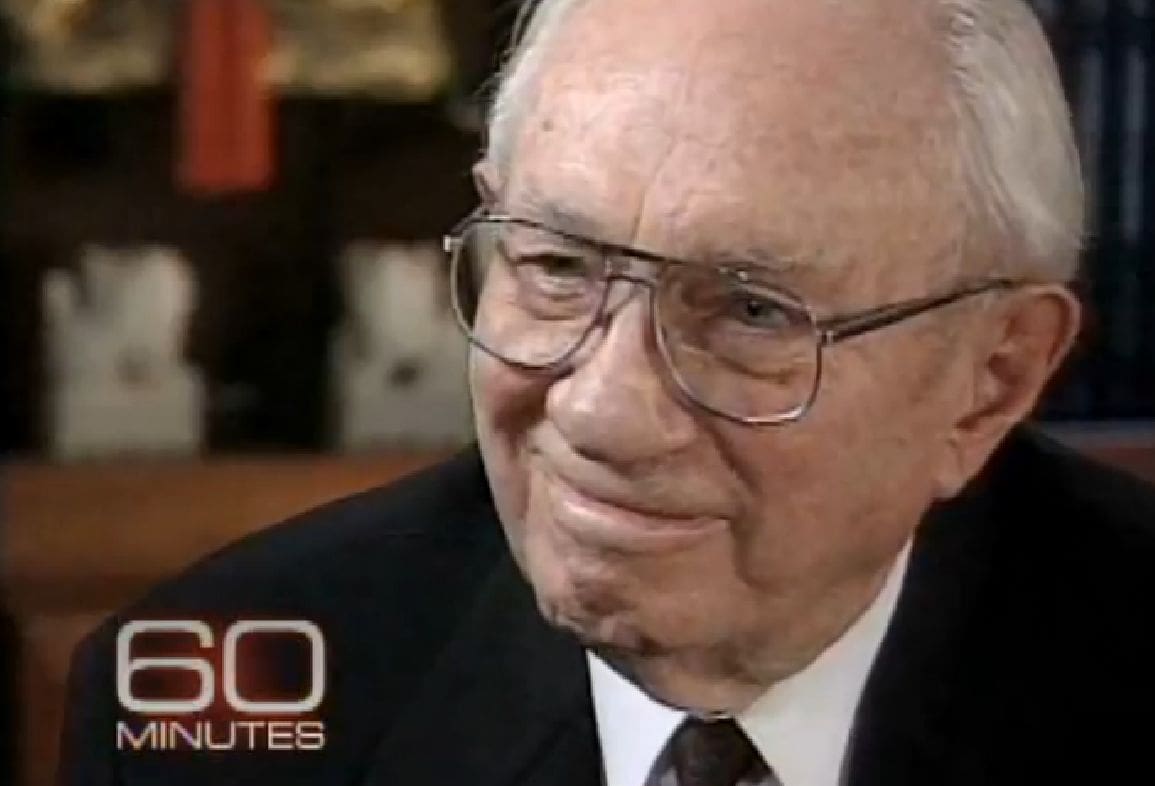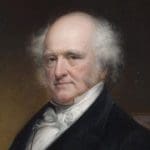Seeing President Russell M. Nelson as a byline in Time Magazine this week (read his op-ed here and Meridian’s commentary here.) ignited my curiosity about other times that prophets have had opportunities to share their voice through the mainstream media. What did they say to an audience that isn’t the one usually listening? What did they want to tell the world, and what would the world allow or not allow them to say?
I read everything from an 1843 interview with Joseph Smith published in the Pittsburgh Weekly Gazette to a Washington Post op-ed from President Thomas S. Monson and much in between, and came away having gleaned some interesting insights into a prophet’s place in the world and the space the world does or does not make for him.
Here are five of those insights:
1. Prophets are Stewards For Their Particular Time Period
Because President Gordon B. Hinckley was the prophet of my youth, I took particular delight in watching the half a dozen or so television interviews he did during his time serving as the President of the Church. He has, by far, appeared in more mainstream media than any prophet before or since. He always took the interview questions in stride and seemed to answer in a way that reflected the warmth and optimism he always led the church with.
But because it felt like hearing from him again after so long, I found myself frustrated that so much discussion was so entrenched in the particular time of the interview. In a live television interview with Larry King, which aired in September 1998, the conversation felt like a time capsule as the interviewer repeatedly brought the conversation around to the then recent discoveries around Bill Clinton’s immoral behavior while in office. One caller asked whether it was true that censored copies of the new film Titanic were being sold in the streets of Salt Lake City.
I found myself wanting to hear something I could use in my life right now, not so many things that were specific to that moment in time. It wasn’t President Hinckley directing the conversation that way, but rather what people chose to ask him that kept making it that way. As I dove into more research, I noted that, likewise, the senior editor of the Pittsburgh Weekly Gazette asked Joseph Smith about his political leanings and where the “Mormon vote” would go in the next presidential election.
His answer has little bearing on what any of us think of the revelations of God that came through this man. I don’t think many of us lose sleep at night over 1840s American politics, and yet we do get quite hung up on the politics of our own times. It seems to be part of the mortal condition that we live our lives bound by our times and cannot always “Think Celestial” as our current prophet has advised us to do.
So, though it frustrated me to find that (not so current) events seemed to so often dominate discussion in many of these journalistic inquiries and appearances, it also taught me that the prophet is called to be a steward in his particular time. I’m not sure Moses’ upbringing in Pharaoh’s court would give him any insights into leading the covenant people right now. He was meant for his time, and each prophet since was meant for theirs.
2. We Ask Prophets the Wrong Questions
Even with that newfound understanding, I couldn’t help yearning for more discussion of, as President Nelson put it in his op-ed, “enduring truths [that] anchor us in turbulent times”. And truly, every time I read about had its turbulence. It seems to be the order of the day in every era. But as a journalist myself who has conducted many interviews, I couldn’t help wondering what I would ask a prophet.
Journalists seemed quite interested in the Church’s rapid growth and, by extension, its wealth. It was often asked what pitch made missionary work so successful, as though it all came down to a marketing strategy. Journalists seemed fixated on the restrictions of the Latter-day Saint lifestyle, which asks so much more of us than average people. Polygamy always arises. The priesthood ban often arises. Journalists seem to poke at the curiosities and never quite get to the heart.
Why isn’t anyone asking the prophet how what he knows has changed the day-to-day reality of his life? Instead of asking with a smirk if he really believes that God himself came to a 14-year-old farm boy, why aren’t they asking how believing that affects him when he runs into his own doubts or questions? Why aren’t they asking how he engages with God? Why isn’t anyone asking how striving to know Jesus in the ways they do changes how they approach grief and sorrow? Or what is the greatest joy of the knowledge they have? Or what is a prophet’s greatest concern that faces the members right now? Or what is the prophet’s vision for the future of this people?
3. Journalists Approach with a Skepticism that Limits What They Can Learn
I know, I ask a lot to expect journalists to engage at that level, because of course, most are not coming from a place of belief, but rather of personal and professional curiosity, and no doubt an obligation to ask what they think the public most wants to know. But, particularly in the early days of the Church, it felt as though journalists could not help but commentate to assure the reader that they may have been intrigued, but were never swayed by their subjects. In an 1859 feature in the New York Tribune entitled “Two Hours with Brigham Young”, author Horace Greeley even overtly claimed, “If I hazard any criticisms on Mormonism generally, I reserve them for a separate letter, being determined to make this a fair and full exposé of the doctrine and policy, in the very words of its Prophet, so far as I can recall them.” To his credit, the first half of the piece was a Q&A that is widely cited as the first newspaper article of that format in U.S. history, but in the final paragraphs, Greeley could not help but criticize and commentate.
He reflected that, “[Brigham Young] spoke readily, not always with grammatical accuracy, but with no appearance of hesitation or reserve, and with no apparent desire to conceal anything…His associates are plain men…and looking as little like crafty hypocrites or swindlers as any body of men I ever met.” That seemed to be the level the early interviewers engaged on. Are these men the criminals they’ve been taken for?
Nearly two centuries later, the criminal assumptions seem to have dropped, but the search for “the catch” continues.
Even Larry King, who was generally quite respectful in his many television interviews with President Hinckley, couldn’t help but jibe, “It’s hard to be a Mormon, isn’t it?” as if hoping that there was some façade to look behind. “No, it’s wonderful,” was President Hinckley’s warm response. “Not hard?” King responded. “No, no, it’s just wonderful. It’s demanding–great expectations, I should say so–but it’s wonderful.”
4. Prophets Don’t Know Everything (and that’s a Good Thing)
One thing I found quite striking about the live television interviews in particular was how often President Hinckley said, “I don’t know” without a shred of hesitation or embarrassment. He answered brilliantly whenever he was engaged on a subject truly relevant to his calling, but when it was something else, he didn’t have any problem saying “I don’t know”. It felt like such a reflection of his humility to stick to expressing what he knows and not speak out of turn when he felt he wasn’t informed enough on something to make a statement. He didn’t feel pressure to pretend to know everything because he wasn’t putting on an act as the soothsaying leader of a mysterious church. He was just a humble, diligent man of faith fulfilling his calling and testifying of the truth he does know whenever he could. It reminded me of a passage from an article by Meridian authors Duane Boyce and Kimberly White that explained how the Brethren council together. They shared how surprised Elder Richard G. Scott was upon attending his first council of the Quorum of the Twelve:
Elder Scott reports that in his first meeting with the Twelve, the Brethren were discussing a very important matter—a matter that would affect the worldwide Church. In his words, the discussion went like this: “And one said, ‘I think we ought to do this,’ and another said, ‘No, this is the right way to go.’ Somebody said, ‘No, I believe we ought to do that.’” No one ever raised their voice or was unkind, but Elder Scott was surprised at their directness and openness in contradicting one another. “I’m sure I had a very perplexed look on my face,” he reported. Then, one of the other Brethren took out a small piece of paper and wrote him a brief note that Elder Scott treasured to the end of his life. It said, “Richard, welcome to the Quorum of the Twelve.” After handing over the note, the Elder explained, “Here we play hardball.”
…
Of his initial experience, Elder Scott emphasized that the Brethren were open in expressing opposing thoughts and that they were also kind in expressing such differences. He said they could do both because “every one of those Brethren is interested in identifying the will of the Lord. They are not trying to convince the others that they’re right. They’re trying to find out what the will of the Lord is.” The other part of the secret, he said, is that they follow the admonition of the Lord that decisions are to be made in a way that expresses all the virtues of discipleship—qualities such as meekness, godliness, brotherly kindness, and charity (D&C 107:30).
The Prophet occupies a unique place in the Church, but he does not work alone. President Hinckley spoke on television as though he was a humble servant of the Lord, not as someone who lived under a pretense of knowing it all. In fact, in a conference address given in 1990, President Hinckley said:
Even the President of the Church, who is Prophet, Seer, and Revelator, and whose right and responsibility it is to make judgments and direct the course of the Church, invariably consults with his counselors to determine their feelings. If there is a lack of unity, there follows an absence of action.
5. Our Society is Making Room for the Prophet to Speak for Himself
In connection with the 10-year observance of September 11 in 2011, President Thomas S. Monson was one of 10 opinion leaders invited by the Washington Post to write on the topic of: “What was the spiritual impact of 9/11?” Others invited to the task included the Dalai Lama, human rights advocate Desmond Tutu, and former British Prime Minister Tony Blair.
There was no interviewing journalist, and the Prophet was allowed to publish something of his own voice unmediated by anyone but perhaps an editor. Though the media has become largely democratized and people can post whatever they want now on social media, having looked over the progression of prophets in mainstream media since the beginning of the restoration, this felt like a turning point.
It was certainly a departure from the 1978 Time Magazine cover story that purported to have based the information on an interview with President Spencer W. Kimball and then (as far as I could see) didn’t quote him once.
President Monson’s message steadily presented those eternal truths despite being tied to a specific historical moment. One that particularly resonated was:
Our Father’s commitment to us, His children, is unwavering. Indeed, He softens the winters of our lives, but He also brightens our summers. Whether it is the best of times or the worst, He is with us. He has promised us that this will never change.
But we are less faithful than He is…If there is a spiritual lesson to be learned from our experience of that fateful day, it may be that we owe to God the same faithfulness that He gives to us. We should strive for steadiness, and for a commitment to God that does not ebb and flow with the years or the crises of our lives. It should not require tragedy for us to remember Him, and we should not be compelled to humility before giving Him our faith and trust. We too should be with Him in every season.
There is power in a Prophet’s voice, be it the one we hear or their voice as expressed in the written word. The op-ed from President Nelson this week is another chance for a national audience to hear a Prophet’s thoughts unfettered by commentary or criticism.
The Church is still frequently misrepresented or even maligned in the mainstream media. I’m grateful to see a trend (subtle though it may be) towards allowing the Prophet to speak directly rather than only be commented on. No doubt the prophetic and apostolic addresses given in General Conference sometimes reach further than these mainstream media outlets. But I hope the chance to reach the ears that aren’t usually listening continues to present itself to our Prophets so that they can share the truths that we all need so much to hear.





















David A. HickenSeptember 13, 2025
As we know that there are no coincidences with God, how timely President Nelson’s Time Op-Ed was. Just before a violent and hateful act was perpetrated in Orem (and throughout our land), our dear prophet gave us the Lord’s teachings of self-worth and the worth of every soul. I heard many commentators and talking heads ponder how we can “turn down the temperature” of political disagreements and especially violence. I shouted at the TV screen several times, “The Prophet of God just told us this last week!” Oh, may we have listening ears and a willing heart to follow!